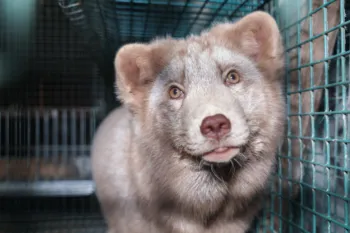BRUSSELS—Fur farming across the European Union fails to meet basic animal welfare needs for mink, foxes, raccoon dogs and chinchillas, says the European Food Safety Authority in its official scientific opinion published today. In response, leading animal protection charity Humane World for Animals Europe (formerly Humane Society International) is calling on the European Commission to urgently bring forward an EU-wide ban on fur farming.
In 2023 more than 1.5 million EU citizens signed the Fur Free Europe European Citizens’ Initiative petition calling for an EU ban on fur farming and trade, after which the European Commission committed to assessing potential action, including taking into account EFSA’s conclusions, after which it is expected to communicate what it considers the most appropriate legislative action by March 2026.
More than 6 million animals are kept on almost 1,200 fur farms across the European Union in countries such as Finland, Poland, Denmark, Spain and Greece. Fur farming is already banned in 22 European countries, including 16 Member States, most recently Estonia, Latvia, Lithuania and Romania and although there is no official ban in Sweden or Bulgaria, there are no more active fur farms there.
Dr Joanna Swabe, senior director of public affairs at Humane World for Animals Europe, said: “EFSA’s opinion confirms what animal advocates and veterinarians have been saying for decades: farming animals such as mink, foxes, raccoon dogs and chinchillas for fur fashion in small barren cages, unsurprisingly causes serious chronic animal welfare problems including suppression of key vital behaviours, stress, injuries and health disorders. The significant physical and psychological suffering described in detail by the multi-national EFSA panel is totally incompatible with modern ethical animal welfare standards. Throughout the report, the experts conclude that the suffering ‘cannot be prevented or substantially mitigated’ in current fur farming systems. This is a damning indictment that leaves the fur trade with no viable future.”
Among key animal welfare problems in current fur farm systems, the report lists:
- Cages of insufficient size and complexity with “barren conditions” which “severely restrict movement” in addition to inappropriate wire-based flooring.
- Sensory understimulation and overstimulation, for different species, leading to chronic boredom and/or stress.
- Inability to exhibit key behaviours including playing, exploring, foraging, digging, jumping or chewing and, for chinchillas, access to sand for bathing, for mink, access to open water for swimming.
- Stress, aggression and injury, including infanticide and cannibalism, caused by lack of space and/or overcrowding and/or inappropriate group housing (e.g. fighting with cage mates and fur chewing behaviours) and/or competition for resources.
- Fear and stress from lack of habituation to humans and injuries caused by catching animals with neck tongs, including during forced insemination.
- Stereotypical behaviours such as repetitive pacing and head bobbing.
- Lameness and bowed legs / leg weakness.
- Gut disorders and inappropriate diet; prolonged hunger and overfeeding in different scenarios.
Dr Swabe concluded: “The idea that the fur industry can deliver a complete revamp of its caged cruelty is fanciful for a trade in terminal economic decline. And a few extra metres of floorspace still wouldn’t come close to replicating a natural habitat or range for foxes, mink and raccoon dogs in the wild, necessary for their physical and mental wellbeing. Fur cruelty has no place in a modern, compassionate Europe and the only humane and ethical course of action now is an EU-wide fur farming ban without delay. A ban would be a landmark step towards ending one of the EU’s most severe and outdated forms of animal cruelty and would also honour the voices of more than 1.5 million EU citizens who signed the European Citizens’ Initiative petition for a Fur Free Europe.”
Fur facts
- Fur farming poses a zoonotic disease risk. Mink on almost 500 fur farms across 13 countries in Europe and North America have been found to be infected with COVID-19, with millions of animals killed on public health grounds. Highly Pathogenic Avian Influenza A (H5N1) has also been found on 72 fur farms in Europe to date. Around 500,000 mink, arctic fox, red fox, raccoon dogs and sable were killed on public health grounds.
- Research shows that the carbon footprint of 1kg of mink fur (309.91 kg CO2-eq) is 31 times higher than cotton, 26 times higher than acrylic, and 25 times higher than polyester. Raccoon dog fur and fox fur also have high carbon footprints, approximately 23 times worse for the climate than cotton, and 18 times worse for the climate than polyester. Compared to other environmentally harmful forms of animal agriculture, the farming of carnivorous animals is worse. The production of 1 kilogram of mink fur releases approximately seven times higher emissions than producing 1 kilogram of beef.
- Most leading designers have fur-free policies including Max Mara, Saint Laurent, Gucci, Alexander McQueen, Balenciaga, Valentino, Prada, Armani, Versace, Michael Kors, Jimmy Choo, DKNY, Burberry and Chanel. Over 1,600 fashion brands and retailers worldwide have committed to being fur-free and as fur becomes increasingly unmarketable and ethically indefensible, fashion houses are choosing to innovate with sustainable, cruelty-free alternatives.
Download photos and video of fur farms in Europe here: https://pressportal.humaneworld.org/dam/search?q=expr%3AFieldName(%22AssociatedAssets%22).Link.Record.Id%20%3D%20%221a2a9da7-dd87-4ce3-8673-b2330118dba5%22
ENDS
